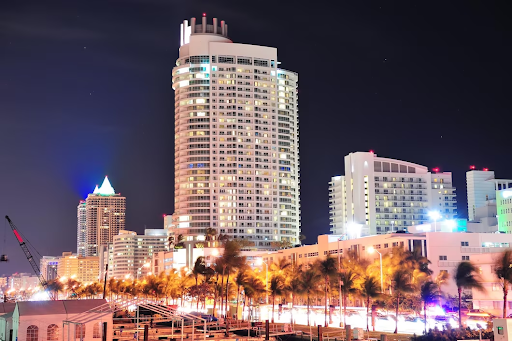Mexico City, with its captivating blend of ancient traditions and modern wonders, has long beckoned travelers from around the globe. However, as visitors traverse its vibrant streets and immerse themselves in its rich cultural heritage, the need for comfortable and accommodating lodgings becomes paramount.
Embark on a captivating journey through time as we unravel the enthralling history of hotels in Mexico City, from their humble beginnings to the grandeur and opulence of today’s luxurious establishments that include traditional and online casinos.
Pioneering Hospitality: The Colonial Era
In the midst of the colonial era, Mexico City, then known as Tenochtitlán, thrived as the heart of the Spanish Empire.
During the 16th century, weary travelers sought solace in mesones or inns, which offered rudimentary accommodations, nourishment, and shelter. Primarily catering to Spanish officials, merchants, and explorers, these humble establishments laid the foundation for developing hotels in Mexico City, serving as crucial stepping stones in the evolution of hospitality.
The Dawn of Elegance: The 19th Century
As Mexico City expanded and modernized throughout the 19th century, the demand for more refined lodgings surged. In 1805, a milestone in the city’s hospitality landscape was achieved with the opening of the Hotel Iturbide.
Originally named the Fonda de San Diego, this establishment transformed into a luxurious hotel, paying homage to Agustín de Iturbide, a prominent figure in Mexican history. The Hotel Iturbide set the benchmark for elegance and comfort, attracting local elites and international travelers seeking a taste of refinement.
Art Nouveau Flourishes: The Early 20th Century
The early 20th century is the beginning of architectural and artistic innovation in Mexico City, which left an indelible mark on its hotels. Embracing the Art Nouveau movement, characterized by intricate ornamentation, sinuous lines, and nature-inspired motifs, hotels became bastions of style and sophistication.
The Hotel Geneve, established in 1907, emerged as a quintessential exemplar of this architectural style. Its opulence and grace drew in luminaries from the world of art, literature, politics, and culture.
Mid-Century Modern Marvels: The Post-WWII Era
Following World War II, Mexico City experienced an unprecedented urban transformation and economic boom.
As a result, this era witnessed a shift towards mid-century modern architecture, showcasing clean lines, functional designs, and harmonious integration with nature. A prominent icon of this era is the Camino Real Hotel, an architectural gem designed by the illustrious Ricardo Legorreta and inaugurated in 1968. Its distinctive pyramid-shaped structure stood as a testament to Mexico City’s modernization and became an iconic landmark.
Luxurious Havens: Contemporary Hotels
Today, Mexico City boasts an extraordinary collection of world-class hotels, each vying to provide an exceptional experience to discerning travelers.
The St. Regis Mexico City, the Four Seasons Hotel Mexico City, and the Hyatt Regency Mexico City are among the premier establishments that offer unparalleled luxury, bespoke services, and breathtaking panoramic views of the city.
These distinguished hotels seamlessly blend contemporary elegance with a celebration of Mexican culture, ensuring a truly immersive and unforgettable stay.
Cultural Immersion: Boutique and Heritage Hotels
In addition to the grand luxury hotels, Mexico City is also home to many boutique and heritage hotels that offer travelers a unique and immersive experience.
These establishments are often housed in beautifully restored historic buildings, showcasing the city’s architectural heritage and preserving its cultural legacy. From charming colonial-era mansions to Art Deco gems, these boutique and heritage hotels provide a glimpse into the city’s past while offering personalized service and an intimate ambiance.
Hospitality as Art: Design Hotels
Mexico City has embraced the concept of design hotels, where every element, from the architecture to the furnishings, is meticulously curated to create a visually stunning and conceptually cohesive experience.
These avant-garde hotels combine artistic expression with functionality, pushing the boundaries of conventional design. As a result, they serve as creative sanctuaries for guests seeking an immersive journey through contemporary aesthetics and cutting-edge style.
Sustainable Retreats: Eco-Friendly Hotels
As environmental consciousness grows, so does the demand for eco-friendly accommodations.
Mexico City has responded to this call by introducing a range of sustainable hotels that prioritize energy efficiency, waste reduction, and a low ecological footprint. These eco-friendly retreats offer a guilt-free stay, allowing guests to contribute to the preservation of the city’s natural beauty and cultural heritage while enjoying modern comforts and amenities.
Innovative Concepts: Co-living and Co-working Spaces
As digital nomads and remote work became the new norm, Mexico City has embraced innovative concepts such as co-living and co-working spaces within hotels.
These hybrid environments combine the convenience of accommodation with flexible workspaces, creating vibrant communities where like-minded individuals can connect, collaborate, and explore the city together.
In addition, these spaces foster a sense of belonging and facilitate the exchange of ideas, making them ideal for long-term stays or those seeking a balance between work and leisure.
Conclusion
The history of hotels in Mexico City is an enchanting narrative that intertwines with the city’s growth and transformation. From humble inns of the colonial era to the opulent luxury hotels of today, the hospitality industry continues to cater to the desires of travelers through constant improvements.
Whether it’s the grandeur of historic landmarks, the allure of contemporary design, or the charm of boutique retreats, Mexico City offers a remarkable variety of accommodations, each with its distinct character and story.
As you embark on your journey to Mexico City, let the city’s hotels be your gateway to its rich history, vibrant culture, and warm hospitality—an experience that promises to be as unforgettable as the city itself.

Comments